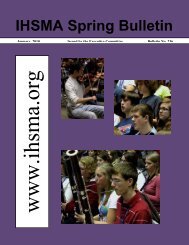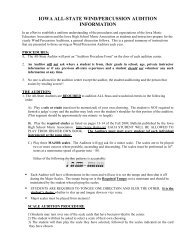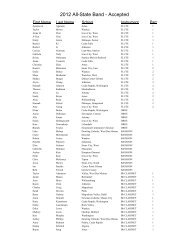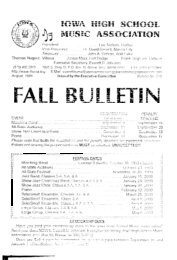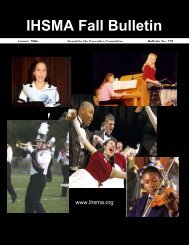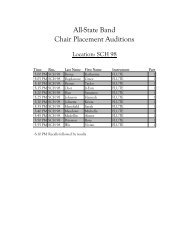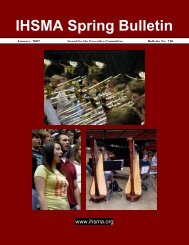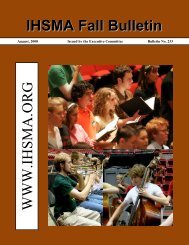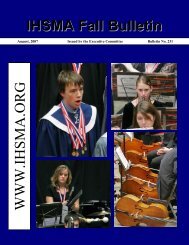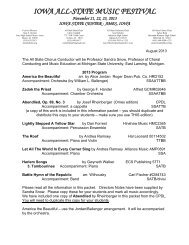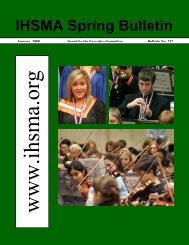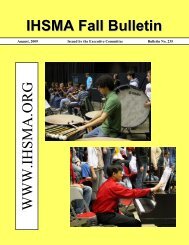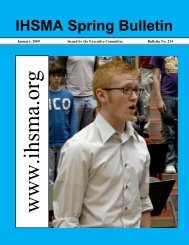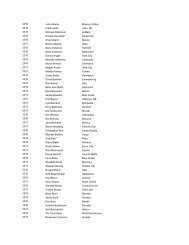IHSMA Spring Bulletin - The Iowa High School Music Association
IHSMA Spring Bulletin - The Iowa High School Music Association
IHSMA Spring Bulletin - The Iowa High School Music Association
You also want an ePaper? Increase the reach of your titles
YUMPU automatically turns print PDFs into web optimized ePapers that Google loves.
U.S. COPYRIGHT LAW AND <strong>IHSMA</strong> FESTIVALS<br />
For a consistent interpretation of the law, this document serves as a guideline as schools/directors/<br />
students approach state festival performances. ANY PERFORMANCE OBSERVED IN VIOLATION<br />
OF THE COPYRIGHT LAWS WILL BE DISQUALIFIED!<br />
IF AT ALL POSSIBLE, the student/accompanist/adjudicator should be provided with a legally<br />
printed, copyrighted, published edition. <strong>The</strong>re is no possible violation if this is done. This can be<br />
borrowed from a neighboring district.<br />
HOWEVER<br />
When this cannot be done, several options lie open to the director. Judges are instructed to<br />
accept, as a legitimate score, any of the following:<br />
1. A copied score with an attached, signed statement from a music supply house stating that the<br />
music is on order and will be delivered and paid for upon its arrival. This order SHOULD BE<br />
initiated at least 30 days prior to the festival date.<br />
2. A copied score with an attached, signed statement from either the publishing company or<br />
composer, verifying the duplication/arrangement that is present. (<strong>The</strong> <strong>IHSMA</strong> website has<br />
Permission to Arrange and Permission to Perform Out-of-Print <strong>Music</strong> application forms available<br />
online.)<br />
3. A copied score containing the application for either Permission to Arrange or Permission to<br />
Duplicate Out-of-Print music that has been originated at least 30 days prior to the festival for<br />
which no response has been received. (This would demand the originator of the forms duplicate<br />
and keep a copy at the time of the original request.)<br />
4. Original Composition. This must contain a statement from the composer granting permission to<br />
perform and/or duplicate.<br />
5. Transposition. Transposition of vocal solo or ensemble literature not available in the needed<br />
key is permissible provided the student/director supply a copy of the original arrangement from<br />
which the transposition was made.<br />
6. Reductions for instrumental ensembles: A director must construct a reduced score for instrumental<br />
ensembles for which no conductor’s score is available.<br />
7. Accompanists may play from duplicated music in a binder or from a digital device (ie. iPad)<br />
provided they give the adjudicator TWO legitimate copies of the score.<br />
Keep in mind that ANY AND ALL arrangements, other than legitimate scores, must have a Permission<br />
to Arrange form attached granting approval. Directors cannot rewrite parts to accommodate a<br />
specifi c solo or ensemble without granted permission. “Cuts” made in any selection, in order to<br />
meet maximum performance time specifi cations, should be made only to avoid unneeded repetition<br />
and not to avoid overly diffi cult passages. “Emergency provisions” of the law allow for duplication of<br />
music that has been lost/destroyed without suffi cient time to secure replacement. It does assume a<br />
legal copy will be obtained to replace lost item(s). <strong>Iowa</strong> music stores with the capacity to generate<br />
music in the desired key via Notestation equipment should stamp each selection with an embossing<br />
stamp assuring adjudicators copyright fees have been paid in the purchase of this service.<br />
Page 17



